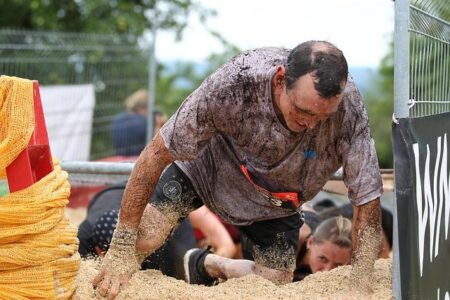In the evolving world of athletic performance, the age-old notion that “fat makes you slow” is facing a compelling reassessment. recent research and advancements in nutrition science suggest that, for many athletes, fat is not just a source of energy but a crucial element that can enhance speed and endurance. In this article, we delve into the emerging evidence that challenges conventional wisdom, exploring how dietary fat can optimize performance, improve recovery, and even revolutionize the way endurance sports are approached.From ultramarathoners to Olympic sprinters, the implications are profound, urging athletes and coaches alike to redefine thier understanding of nutrition and its role in the quest for speed. With insights from leading experts and real-life testimonials, we examine the intricate relationship between fat consumption and athletic prowess, paving the way for a new era of performance nutrition.
The Metabolic Advantage of Fat as Fuel for Endurance Athletes
Endurance athletes are increasingly turning to fat as a primary source of fuel, capitalizing on the body’s inherent ability to burn fat more efficiently than carbohydrates during prolonged exercise. This metabolic shift not only enhances performance but also offers a range of physiological benefits, such as improved insulin sensitivity and better fat oxidation rates.Athletes who adapt to utilizing fat can sustain their energy levels for longer, perhaps leading to a meaningful competitive edge in endurance events. When the body taps into fat stores,it can access vast reserves of energy,allowing athletes to push thru demanding workouts without the common spikes and drops associated with carbohydrate intake.
Transitioning to fat as the principal fuel source involves strategic dietary modifications and training adaptations.Key strategies include:
- Incorporating a high-fat, low-carb diet: This minimizes glycogen stores, encouraging the body to utilize fat.
- endurance training at lower intensities: This optimizes fat oxidation pathways and enhances the body’s ability to use fat.
- Intermittent fasting: This can further promote fat utilization by depleting glycogen stores.
Additionally, a comparison of energy sources reveals the distinct advantages of fat:
| Energy Source | Calories per Gram | Time to access |
|---|---|---|
| Fat | 9 | Slow-release |
| Carbohydrates | 4 | Quick-release |
athletes who methodically shift to fat as their primary energy source can enhance endurance, optimize energy levels, and ultimately improve their athletic performance. With the right approach, adopting fat as fuel is not just a nutritional choice but a strategic advantage in the quest for athletic excellence.
Integrating Healthy Fats into Your Training Diet for Enhanced Performance
Incorporating healthy fats into your training regimen can be a game-changer for athletes seeking to optimize performance. Unlike the traditional notion that fats are detrimental to fitness, recent studies reveal that monounsaturated and polyunsaturated fats play a crucial role in energy production and recovery. These types of fats not only provide a concentrated source of energy, enabling sustained performance during prolonged workouts, but they also serve as essential building blocks for hormones and cell membranes. By focusing on the right sources, athletes can fuel their bodies effectively without compromising on health.
To effectively integrate healthy fats into your diet, consider the following nutrient-dense options that can enhance your performance:
- Avocados: Packed with potassium and fiber, they help in muscle recovery and hydration.
- Nuts and Seeds: Almonds,walnuts,and chia seeds offer omega-3s which have anti-inflammatory properties.
- Fatty Fish: Salmon and mackerel are rich in DHA that can support brain function and stamina.
- Olive Oil: Incorporate this healthy fat in dressings or cooking to improve heart health.
To visualize how these fats can fit into your daily training meals,consider the following table that breaks down recommended serving sizes and benefits:
| Food Item | Serving Size | Key Benefits |
|---|---|---|
| Avocado | 1 medium | Rich in potassium; aids recovery |
| almonds | 1 ounce | High in vitamin E; boosts energy |
| Salmon | 3 oz. | Omega-3s; improves endurance |
| Olive Oil | 1 tablespoon | Heart-healthy; anti-inflammatory |
Debunking Myths: The Science behind Fat Adaptation in Sports nutrition
The notion that carbohydrates are the sole fuel source for endurance athletes has long been entrenched in sports nutrition. However, emerging research is challenging this paradigm by highlighting the potential of fat adaptation for enhancing athletic performance. Fat adaptation refers to the process of training the body to utilize fatty acids as a primary energy source, which can led to increased endurance, improved metabolic efficiency, and reduced reliance on glycogen stores. This is notably advantageous during extended periods of exercise when glycogen stores may become depleted, allowing athletes to sustain performance over longer durations without the typical fatigue associated with “hitting the wall.”
Critics often argue that shifting to a fat-based fuel system may hinder high-intensity performance due to the slower rate of energy release from fat compared to carbohydrates. However, recent findings suggest that trained athletes can achieve significant benefits by incorporating a strategic approach to fat adaptation. Consider these points that illuminate the advantages of this nutritional strategy:
- Enhanced fat oxidation: Athletes can tap into their fat reserves more efficiently, conserving glycogen for when it’s truly needed.
- Increased metabolic adaptability: By training the body to switch between fuel sources, athletes can better adapt to varying intensities during competition.
- Improved recovery: Utilizing fat as a primary fuel source can minimize muscle damage and enhance recovery times.
Future Outlook
the intersection of dietary fat and athletic performance continues to challenge traditional beliefs about nutrition in sports. As research sheds light on how various types of fats can enhance endurance, boost metabolism, and support overall energy levels, athletes are re-evaluating the role fat plays in their diets.The implications extend beyond elite competitors; everyday fitness enthusiasts might also benefit from understanding and incorporating healthy fats into their meals. As the conversation around fat evolves, so too does our approach to training and nutrition, urging us to rethink how we fuel our bodies for peak performance. As the sporting world embraces a more nuanced viewpoint on dietary fats, the potential for improved outcomes in speed, stamina, and overall health remains an exciting frontier for athletes and researchers alike.





